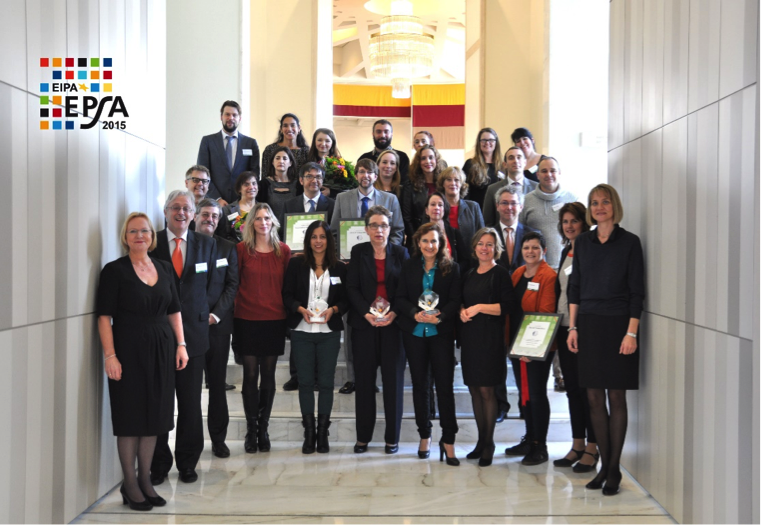The 5th EPSA edition was launched on 5th February 2015. It was the first time that the EPSA was fully launched online with a widely viewed and well received launch video. It was organised and managed by the European Institute of Public Administration (EIPA) with the political and financial support of 12 official partners.
As in 2013, this edition invited public innovators across Europe to submit their achievements under one overarching theme “The Public Sector as Partner for a Better Society”. Projects were awarded in two different categories based on the level of administration:
Category 1: European, national and regional
Category 2: supra-local and local
In addition, a third award was presented to an outstanding project – drawn from both categories – with a significant cross-cutting perspective (e.g. cross-border, cross-administrative, cross-sectoral, etc.).

The winners of the three awards were:
Supra-local/local administrative category: Every Child Safe Forever – The Development of Relentless Family Case Management and the End of Parole and Other Court Orders, submitted by the Youth Protection Amsterdam Region (NL). This project is an innovative example of effective public service delivery through efficient and effective family-based case management. This new method was achieved by changing all the important elements of the organisation: structure, support systems and physical working environments. The principle applied is One Family, One Plan and One Professional. Thus, it is a tailored and user-centred service involving each family as key stakeholder and taking their reality into account. The holistic change methodology applied can be considered as brand-new. This change has significantly improved situations for children and their families and at the same time resulted in budget savings of overall €30 million so far.
European/national/regional category: BQ-Portal – The Information Portal for Foreign Professional Qualifications, submitted by the German Federal Ministry for Economic Affairs and Energy. This initiative addresses an issue of high-level political importance in Germany, namely skills shortages, and in the EU in the form of mutual recognition of qualifications. All relevant information on the equivalence of a wide range of foreign vocational training systems and individual foreign professional qualifications is consolidated in a single database. This is a unique initiative as it is the first portal of this kind at national or European level. The portal achieved significant results such as the impressive number of 73 country profiles and more than 1400 professional profiles. The high level of user satisfaction equally underlines the importance and relevance of this exceptional project. The project addresses a challenge that many European countries face and thus holds valuable lessons for other administrations.
Cross-cutting award: Urban Environment and Health, submitted by the Barcelona Provincial Council. Introducing health perspective in the design of cities and towns is clearly a novel approach. The resulting joint activities such as building knowledge, developing products and promoting research present a true added value for society as they improve the health of all citizens. This project creates synergies between different areas of political action and across 13 administrative departments (involving 49 professionals from 15 different disciplines) to promote healthy urban environments. This project is innovative as it truly breaks down institutional silos, crosses different sectors and engages in horizontal and vertical administrative cooperation. Health is integrated into other policies not only by regulation, but mainly by “leading by example” and by providing training coupled with a well-stocked online database. This is an excellent example of how education can work to help realising goals.
64 projects submitted by 21 European countries and the European institutions received a recognition in 2015 (out of a total of 266 submitted projects form 36 countries and EU institutions). 37 BPCs came from the European, national and regional level and 27 from the supra-local and local level. This means that 55 projects were awarded a Best Practice Certificate and 9 projects were nominees (full list of best practices), out of which the three winners were identified.
For more information, visit www.epsa2015.eu and download the EPSA 2015 publication ‘The Public Sector as Partner for a Better Society’ (containing a research part and a catalogue part with the 64 best practices).